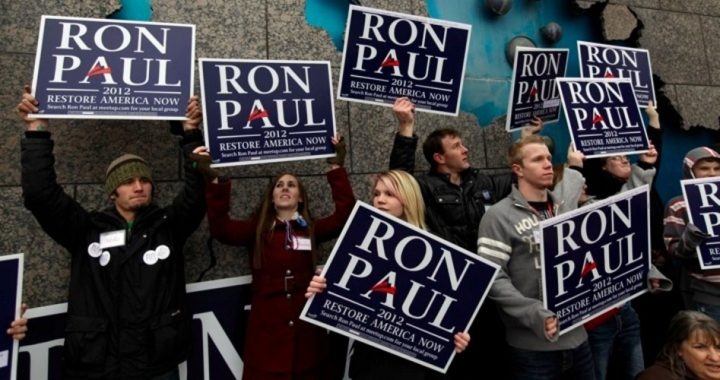
Word out of Idaho is that the Ron Paul bloc in the Gem State’s GOP, perhaps encouraged by recent events at the Nevada and Maine state Republican conventions, plans to attempt a similar strategy.
According to local media, many supporters of Ron Paul in Idaho are “so disgusted” with their man’s third place finish in the Idaho caucus that they are anxiously engaged in righting that wrong.
How serious are the backers of the libertarian-leaning Texas Congressman? “I’ll do the scorched earth if I have to,” declared Ryan Davidson, third vice chairman of the Ada County Republican Party and a grassroots Paul campaign organizer.
The plan as it’s been revealed is for the Paul camp to use state party rules to their advantage and wrest control of the GOP state convention in June through the accumulation of delegates in the little-publicized precinct committee meetings to be held statewide on May 15.
In a video posted to YouTube, Davidson boldly describes the scheme:
If two-thirds of the delegates to the Idaho State Convention are Ron Paul supporters, they can vote to suspend the rules, overturn the results of the caucus and award all the national delegates to Ron Paul.
An attempt to link to the video in this article reveals that it has been removed.
As readers may recall, Mitt Romney (the RNC’s “presumptive nominee”) carried Idaho, winning 62 percent of the vote at caucus on March 6.
This was Idaho’s first presidential caucus (the state previously held a primary in late May), and over 44,000 Republicans participated in the inaugural process.
Official results of the caucus indicate that Ron Paul received 8,086 votes (29 votes fewer than former candidate Rick Santorum), or 18.1 percent of the total. Former Speaker of the House Newt Gingrich brought up the rear winning just 940 votes.
As was the case in Maine and Nevada, there are those who argue that the delegate-targeting strategy is invalid and that any delegate elected at the state convention must commit himself to cast a vote for the eventual Republican nominee (read: Mitt Romney) at the Republican National Convention in Tampa in August.
Much of the debate over whether these so-called “rogue delegates” can vote their consciences rather than be bound to vote for the candidate who won the state’s popular vote centers on the interpretation of a Republican Party rule.
Republican National Committee Rule Number 38 states: “No delegate or alternate delegate shall be bound by any attempt of any state or Congressional district to impose the unit rule.”
The Unit Rule is a rule requiring all delegates from a state or congressional district to vote as a unit, that is to say, for the same candidate.
Some argue that the states get around this rule by not technically binding all of their delegates. States will bypass the strictures of RNC Rule 38 by binding all but a few of their state’s delegates, thus obeying the letter of the law if not the spirit.
But is such a technical tactic permitted by the Republican National Committee?
In an article published by FairVote.org, the following analysis of the situation was provided:
Rather, we explain that the RNC rules’ provision on the unit rule make it clear that delegates aren’t bound to vote according to how most delegates from their state are voting. In fact, delegates can vote according to their own judgment and conscience, and that this is most likely to take place in a state where a state party’s winner-take-all rule has allowed a candidate to win all delegates primarily due to a split in the majority vote, or due to votes cast by non-Republican voters participating in the contest.
To explain our case, we look to the language of Rule 38, which was adopted in its current form in 1964. The rule states: “no delegate shall be bound by any attempt of any state or Congressional district to impose the unit rule.” The unit rule does not prohibit a state from using a winner-take-all primary in the same way that Rule 15(b) prohibits most states from using a winner-take-all primary when holding a contest earlier than April 1st. However, the unit rule does prohibit binding delegates to vote according to how a majority of delegates from their state vote — again, a scenario most likely to occur in a state using the winner-take-all rule.
As set out in the Rules of the Republican Party, delegates have the ability to vote according to the delegates’ preference, even if that is contrary to the outcome of each state’s primary. According to one source, the legal counsel for the Republican National Convention in 2008 stated: “[The] RNC does not recognize a state’s binding of national delegates, but considers each delegate a free agent who can vote for whoever they choose.” Thus, if a delegate were to challenge his or her ability to vote as a free agent, he or she would have grounds under Rule 38.
Evidence of the RNC’s interpretation of its own rule was presented in 2008 when a delegate from Utah refused to vote for John McCain, the winner of the Utah popular vote. The delegate wanted to cast a vote for Mitt Romney. When the matter was referred to the RNC’s general counsel, the response is illuminating and likely relevant to the present Ron Paul controversy. The RNC attorney wrote:
“[The] RNC does not recognize a state’s binding of national delegates, but considers each delegate a free agent who can vote for whoever they choose. The national convention allows delegates to vote for the individual of their choice, regardless of whether the person’s name is officially placed into nomination or not.”
That is about as clear and definitive a restatement of the RNC position as can be expected.
And, it appears to be good news for the state delegates from Nevada and Maine (and other states) who would like to see Ron Paul nominated from the convention floor.
There may be good reason, then, for the Idaho Ron Paul contingency to take heart. Not only do they have the state conventions in nearby Nevada and far away Maine to embolden them, but by implication, the RNC’s own lawyer appears to approve of their plan, as well.
Curiously, the Ron Paul campaign’s official response to the Idaho plan to mount a grassroots takeover of the state convention is not as favorable.
The Ron Paul 2012 Presidential campaign released the following statement regarding the alleged “takeover” of the Idaho Republican Party State Convention:
Recent reports in The Idaho Statesman misrepresent the Ron Paul 2012 Presidential campaign’s involvement in the Idaho’s Republican precinct captain races that follow Mitt Romney’s first-place showing in the state’s inaugural caucus that took place on March 6th.
The Ron Paul campaign’s delegate-attainment strategy being implemented nationally at party processes that follow so-called “beauty contests” is not, and has never been, meant to somehow rewrite the outcome of past nominating contests.
In Idaho, isolated instances of grassroots activists working toward an ostensible “hostile takeover” of the GOP are not sanctioned by the Ron Paul national campaign.
Sanctioned or not, the Ron Paul campaign doesn’t have to back a plan in order to benefit from it. Noticeably, there is nothing in the campaign manager’s official statement that indicates that Paul would refuse to accept the 30 or so additional delegates should they be elected at the Idaho Republican Convention in Twin Falls on June 22.
Photo of Ron Paul supporters in Idaho: AP Images



